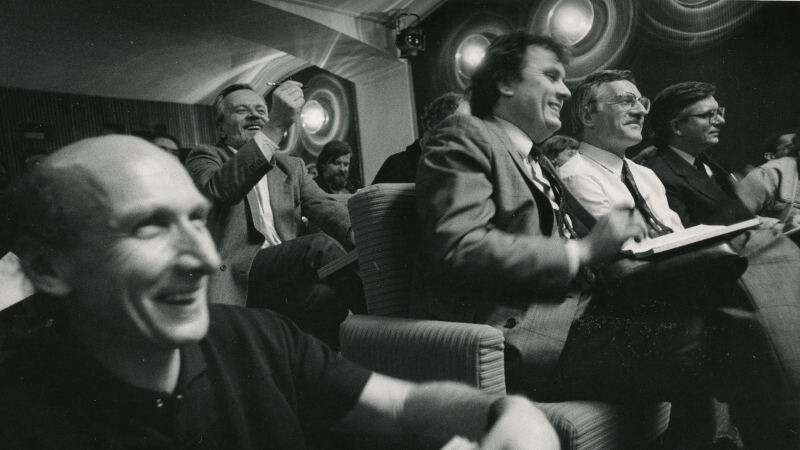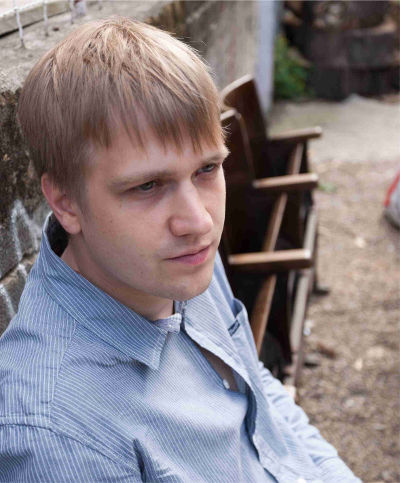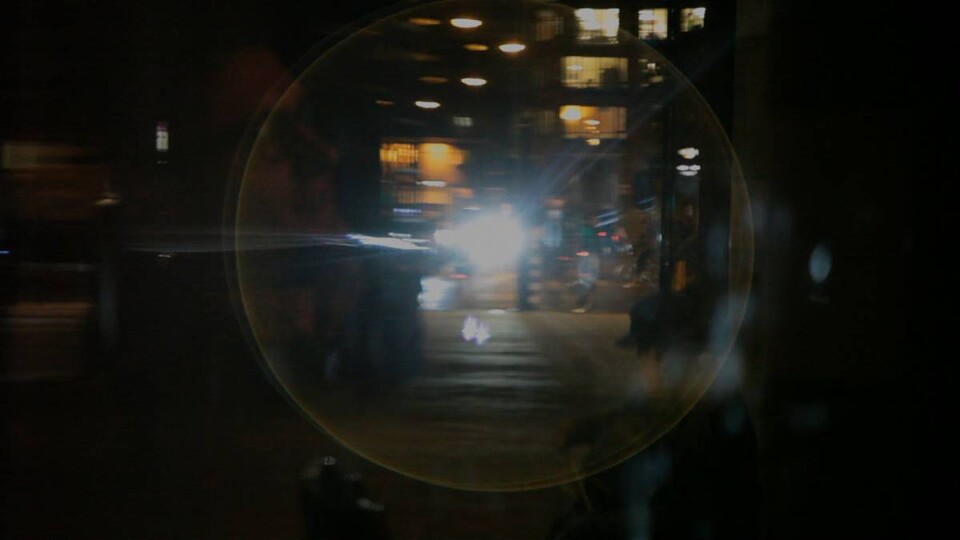The Most Difficult Thing is to Find Simplicity
The thirty-one-year-old documentary filmmaker, Martin Kohout, is currently finishing his third film The Czech Way, in which he strives to provide a complex portrayal of the social and political mood at the time of the voucher privatization. Kohout dedicated also his diploma thesis submitted as part of his programme at Charles University to the Czech economic transformation as a background material for his upcoming documentary. Last year’s Jihlava presentation of the rough cut of his work at the Work in Progress section sparked a heated debate as the visitors and the organisers of the voucher privatization felt the urge to express their opinions on the country’s past development. In an interview, the director describes the analogy between the approach of the political representation and the society at the time.
Last year’s edition of Jihlava International Documentary Film Festival showed your upcoming film The Czech Way in the Work in Progress section. What did you think of the screening’s atmosphere?
I was shocked by how many people had arrived. It was incredible that every single visitor had an issue with the progress of the Czech voucher privatization and needed to let off some steam. People currently see the nineties as a truly traumatic period and almost everyone at the Q&A had the urge to say what they felt that had actually happened during Klaus’ privatization – whose interests were harmed and to what extent, and who was to blame. My first such experience was at the screening of Privatization of Barrandov at Prague’s Municipal Library, but the reactions were mostly negative, although for the same reason.
Where does this urge to comment on the issues brought up in The Czech Way come from?
It is in fact a wide range of issues – and we haven’t realised until now that as a society, we haven’t yet reached our goal, and some of us have not come to terms with the fact that, in one way or another, they supported the political ideology that has brought us where we are. People want to put blame on particular people and they don’t admit that the society’s mind-set also played a role in the process. The feeling that we are the passive victims of the quirks of history has always been present in our nation.
What do you see as the main problem of the voucher privatization?
My main interest was whether it was a natural social development, or rather a process controlled by some “madman”. Don’t you find the idea to use the voucher method to privatize a vast majority of the economy, including business attractive for foreign investors, and wait what will happen rather sick and crazy? The majority of businesses needed major restructuring and the voucher method didn’t allow for it. It only enabled “privatization” of companies and businesses, however, without any other effects that it entailed in other countries – that is in terms of investment capital, know-how and potentially also experience with new markets, which was another key aspect at the time of the collapse of the CMEA. Dušan Tříska’s theory of creative destruction says: we will destroy everything, let’s drain all the capital away by selling of all that’s left in the company, and invest the funds into something new. I don’t even want to tell you about the things that were afterwards happening on the capital market with such funds and businesses. Besides, after the privatization, some companies had more owners than employees. How can they be effectively and responsibly managed? It therefore seems that in addition to its fast pace, there was no rational economic justification or reason to opt for this type of privatization, and that mainly political – that is social and power-driven interests were at stake – and that’s an interesting point.
But don’t you think that common people – who were used to think and act in a certain way – also had their share in the process?
They certainly did. Capitalism had been here long before the emergence of the black market, because many things were impossible to get. For instance a new bike, TV set, music or even clothing. People used to exchange almost anything. The network of various connections and behaviour patterns was long ago set and ready and the waving of flags in November was really only symbolical. You can’t change the society in two weeks. The U.S. historian James Krapfl shows that the discussion going on during the Velvet Revolution was only very general. Most often, people used words such as freedom, end to violence, fair play, collaboration, truth, but also socialism and environmental protection. It’s similar to reading a fairy-tale, you know that the good should prevail over the evil, but at the same time, you are aware that life is an entirely different thing. In fact, people already had other things on their mind. The normalization period significantly affected their character, because the system had forced them into a certain position. Nobody cared what will happen with the state because the state was an enemy.
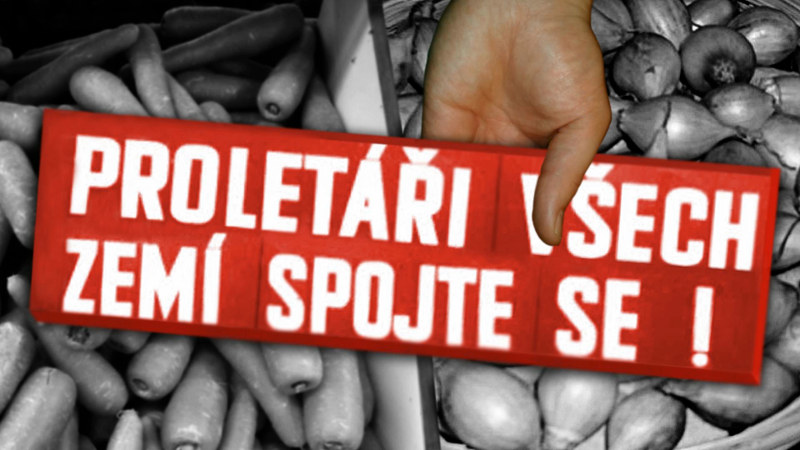
The Czech Way (motto: Workers of the world, unite!)
What condition was the society in shorty before the revolution?
The society was more or less malfunctioning. Had people had a different mind-set, nothing like the voucher privatization would have been allowed and they would have sought forms of social transformation other than economic-engineering schemes. In that case, the civil society would have had more extensively developed foundations. There were a handful of dissidents who were practically unknown. They created a more or less autonomous intellectual centre that certainly did not reflect the mind-set of the majority society. The society just wasn’t ready for such a change.
Do you think that with the onset of the 21st century, we took a different and more promising direction?
It’s more complicated than that. In my opinion, in addition to other things we are constantly struggling with the same old problem regarding the fragmentary character of public debates. For instance, there’s a misconception in relation to the traditional role of the left and the right as they have been known in the European context for centuries. People’s opinions are not connected with the system or a certain set of values, concepts and programmes. They should rather be seen as labels – related to their personal taste, like clothes. And try to criticize someone’s style in clothing all of sudden. The presidential campaign of Karel Schwarzenberg and his followers is a fitting example, but it definitely is not the only one.
Is there perhaps some balance between the political representation and the society?
There certainly is, but the question is how that balance is achieved. Politics always mirrors the moods in the society. Some ideas of politicians are passively accepted, while some opinions of the society are imposed on politicians, but the mutual relationship is more complicated than that. Looking back on the voucher privatization, there are two options. The whole thing might have happened only thanks to the state of the society that was affected by normalization and regarded the state merely as a source of building blocks and cement, or the whole thing was orchestrated by political elites. To be more specific – whether to blame Klaus along with Tříska and Ježek or the whole society and its mind-set for accepting and implicitly even demanding such a solution.
How do you work with this dynamics in your film?
Using specific examples, I’m trying to illustrate the convergence of the social level with a specific political conduct and the fates of a politician who was forced to act. On several occasions, there was a chance of reversing the process, but that didn’t happen. But all it would have taken was the people from the Civic Forum to be politically more efficient and clarify their ideas to people. The question is whether that would have been possible. I’m trying to get to the core of the whole problem, to find and analyse the main impulse behind the revolution and privatization, taking into account the dialectics of these two aspects.
The unofficial information regarding the running time of The Czech Way indicates that it could reach up to two hours. Can such a broad range of events be crammed into such a relatively short running time?
The film shows many reflections, analyses and a great deal of generalisation. Its structure may resemble an essay, but I’d rather wish for a novel. I wanted to show all topics, problems and reasons of the voucher privatization, such as revolutionary radicalism, anti-communism, impatience, but also nationalism or personal and generation problems in civic forums. In order to create a sufficient space for a more complex reflection on the social and political events at the time, I need to show how the events are connected and explain the individual relations and tensions. And that’s simply impossible if you work with a feature-film format. In this respect The Czech Way will be much more difficult to handle, but it will definitely be worth it.
In your previous films (JUDr. Michal Danišovič, The Invisible Hand of the Market: Privatization of Barrandov) you use the method of talking heads that is visually very monotonous. Do you use the same method also in The Czech Way with such a long running time?
Yes, I do. And I am actually a bit unhappy about it. One hour seems to be the limit for this method. And it might be too much to force the audience to watch heads talking for two long hours. When you’re making a documentary about events that happened in the past, you don’t have many other options. No video recordings of important meetings, interviews and events are available. The only source you can work with are witnesses, usually older people who you cannot ask to walk up and down Wenceslas Square to make the film more dynamic. It would have been too difficult and often even unfeasible. It is important for the individual speakers to follow up on other’s speeches, which ensures a certain degree of dynamics and variability of their utterances. In this way, you can create a coherent story that unfolds on various political and social levels.
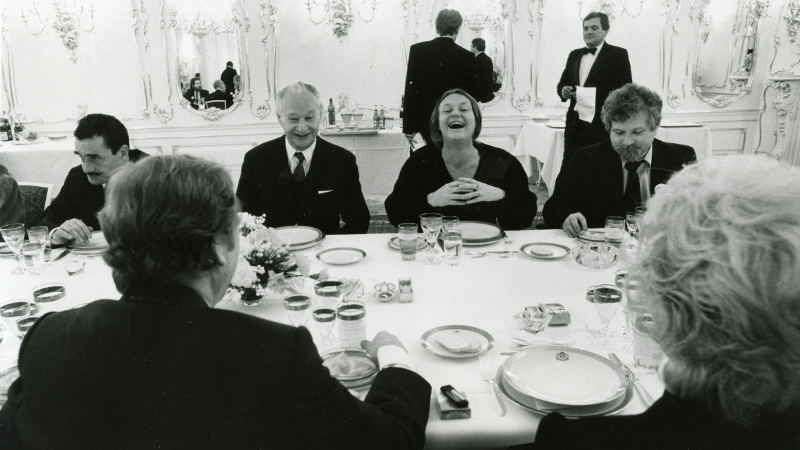
Václav Havel and Alexander Dubček during their meeting in the Prague Castle
Your films are often very accurate in terms of information they work with. What does your work on the script look like? Do you spend hours in archives?
I guess that I actually do something that a documentarian should not do. I draw a comprehensive picture of the events based on the available sources and archival materials and then I speak to people – which is totally OK. I try to chart up a whole map of possibilities of how the story can be told. What I want to hear from people is more or less what I need for my story, although they sometimes say something completely different. I don’t choose people, waiting what they’re going to say, only to edit the footage to achieve the desired effect. I prefer to plunge deep into the issue, to find out, where the boundaries are, choose what information is important, and use it to create a story, which, however, doesn’t mean that I ignore the resulting footage; but the emphasis on filling in my own interpretation frame might be too unnatural for a documentary genre.
Does that mean that you like to produce elaborate and lengthy scripts?
In the case of The Czech Way my script was basically my eighty-page-long diploma thesis written during my studies of sociology at the Philosophical Faculty of Charles University. I’ve been working on the film for three years now. And I have about 50 hours of footage. That’s quite a lot, but proportional to the complexity of the topic.
Isn’t it actually detrimental to the whole project to work with such a huge amount of information?
If I don’t manage to sort it out, then it could be. You have to make sure not to get lost in the footage. But otherwise it’s nonsense to say that the less you know, the better. By far the hardest thing is to separate the important stuff from the less important, to find the easiest way to tell the story. The key is to pinpoint the basic line which would run through the historical events, to determine the points that best communicate the plot, to know why these points are more important than other things that will basically remain hidden. And the most difficult thing is to realise how to make it all simple. And a one-and-a-half-hour-long interview eventually boils down to three minutes.
Do you consult the film’s editing with dramaturges?
I consult my films with Karel Vachek, a lecturer at FAMU. People who don’t know him or don’t like him may find him a perhaps a bit stubborn, but he’s a great filmmaker. When he analyses a film, he knows exactly what doesn’t work, where to swap or edit scenes. But I don’t like it when an editor takes over the role of a dramaturge. That’s why I edit The Czech Way myself, I wouldn’t be able to work with someone who hasn’t read anything about the topic. How would he know what’s important? And what to cut out? An editor can only help at the stage when the film already contains all that’s relevant. Some things are doubled and need to be edited, swapped, made easier to comprehend. At this stage, the editors are certainly more skilled than I am, but that’s only the very end of the process.
What does the term dramaturge mean to you?
An external control which can take the film to a successful end. A dramaturge is someone who is able to pinpoint the core of the problem and the meaning, and also ring the bell if the filmmaker is going completely mad. In my opinion, Karel Vachek, Petr Kubica, Martin Mareček and Jan Gogola are great dramaturges, exceptionally clever people. But they were discouraging me – with the exception of Vachek, who supported me – from shooting The Invisible Hand of the Market. Martin Mareček didn’t manage to dissuade me from my goal to delve into the issue in his workshop, and so he recommended me to show an excerpt from the film at a pre-dissertation presentation at school in January. The teachers at our department were upset about the talking heads method and gave me a really hard time. Afterwards I thought that they were going to kick me out of the programme.
But you made the film and stayed at FAMU. What have you changed?
Nothing, I finished Privatization of Barrandov being aware of all the risks that the matter entailed. After all, it doesn’t make sense to make a film about something that you’re not interested in, or give up on a topic that someone else doesn’t want you to make. That would be the end of the creative approach – lately a widely discussed topic – wouldn’t it? I didn’t study at FAMU to become an artist but because I am concerned about some problems. When I finally came up with the idea to make The Czech Way, Mareček only shrugged it off saying – let him shoot it, if he wants to.
Have you ever met people who would expressly disagree with what you are trying to achieve in The Czech Way?
I only recall one situation when Czech Television did not want to be involved as a co-producer. I found it a bit weird, although there is no a priori entitlement to obtain support. Slovak Television was actually very keen to collaborate on the topic, Czech Radio wanted to make it into a documentary series, and also the State Fund for Cinematography offered its support and also the Slovak fund seems to be interested. It was rather strange. They didn’t want to co-produce the film saying that so many films have been made about the voucher privatization. What they most probably had in mind were excerpts in some programmes. However, we managed to agree on collaboration regarding the purchase of rights to archive materials. That has helped us a lot, but if this hadn’t worked out, the film would have most probably never been made.
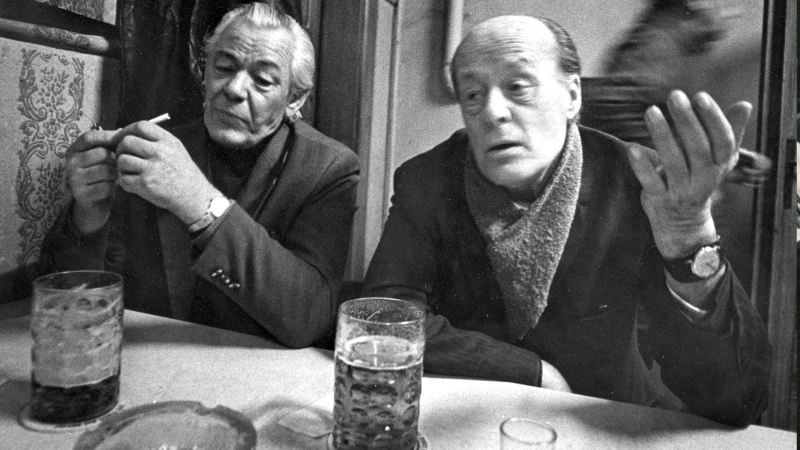
Common men
Do you think that it was the topic of privatization what Czech Television found problematic?
Who knows? People usually think that the Velvet Revolution was a beautiful thing, they like Havel, and they believe that something went wrong during the privatization – but let’s leave it be. Let’s be grateful for what we have – it could have been much worse! Some people might be unhappy that someone has again, or actually for the first time, opened the topic. Perhaps they don’t want to dig into the past or find it unpleasant or it is just a coincidence or a problem of the system.
Do you mean the system of creative producers, the Film Centre, the approval committee that has been operating in Czech Television since 2012?
The problem is in fact that creative producer groups don’t have their own budget or enough programme slots. Each idea and concept has to be submitted for approval to these committees composed of members of Czech Television’s management. Being swamped with so many projects, they can’t dedicate more than several minutes of their time to each of them. They would have to be geniuses to be able to assess the potential of projects from many different areas. And they of course have their favourites. Everyone feels that the approval process may eventually be organised as a lottery. Creative producers may try to send as many concepts for approval as they can, so that at least some would succeed, overloading the committees and their own capacities resulting in deterioration of the quality of the films, because nobody knows whether the projects can actually be implemented. This is wrong and has to be changed. And we as a community of filmmakers have to make these changes happen. Czech Television has a great potential as a producer of documentaries but this situation is holding back its progress.
The focus of your bachelor’s thesis at FAMU, was on the relationship between documentary film and Foucault’s theory of discourse. What was your conclusion?
I read several books by Foucault. Then I needed a topic for my bachelor’s thesis and this knowledge came handy. Foucault’s theory represents more or less only a different form of structuralism – I know he would have objected – I mean the idea of a fixed language structure or methods used to change a text within the discourse of a given system. And every discourse consequently tends to exclude certain aspects as irrelevant, not worthy of reasonable reflection. However, the documentary genre defies this theory. You can clearly see how things are moving, people’s faces, but you can no longer dissolve these facts in language, in a certain system of hegemony of narration. Documentary film may redefine the perspective of certain things, thus defying simplified interpretations. For example, Martin Mareček’s Solar Eclipse about the problems of helping developing countries in practice will teach you more than a study of two hundred pages. What you directly see cannot be easily summed up in the form of statistics and ideological propositions.
One of Foucault’s theories is the truth/lie pattern. Can a documentary film lie?
No. Never. A documentarian can never lie, because the audience would always be able tell. Perhaps not at the first sight, but later they would. It will always show if you fail to respect reality and try to distort it in one way or another. That’s great, isn’t it? A real insight into reality. You can see everything. Had I decided to edit the utterances in a completely different way, according to the impression I’d wanted to achieve, and manipulated what they were saying, you would be able to tell. You can’t force reality into a mould that doesn’t fit. I believe that a documentary film is perhaps even a more efficient instrument than a quantitative sociological analysis. Isn’t it foolish to try to quantify opinions? Quantification is a plague and its dissemination now feeds the predominant part of contemporary sociology, often only in order to improve the sales potential of specific goods.
Your next documentary should focus on today’s society and its self-reflection. What specifically will be the film’s topic?
I would like to make a film about suicides, to start from Durkheim’s proposition that suicides serve as the society’s litmus paper. And the number of suicides either rises or drops depending on the development in the society. And even this individual decision mirrors the atmosphere in the whole society. In our head, we can hear all the on-going discussions about refugees, the postmodern and neoliberal arguments that the market will save us all, or, for instance, grudges against Russia. We say that we’re talking politics and in fact we’re only discussing the same old clichés and form our opinions on their basis. What appeals to me is the challenge to try to capture the mind-set that forms the reality in a way that eventually produces dead corpses. We need to realise that the countless comments in the public space, and the arguments we use, are somehow related to the arrangement of the society and the consequences that are very real and tangible. What we need is to better realise the relationship between what we say and the physical reality that surrounds us. Babbling is not harmless, it has serious consequences.
|
|
Martin Kohout (1984) initially enrolled to study sociology at the Philosophical Faculty of Charles University. However, being disappointed with the transformation of the society in 1990s, he decided to change for FAMU’s Documentary Film Department where he has so far made two films – a portrait of a former police officer who was in command of the brutal action against protesters on Národní třída in 1989, JUDr. Michal Danišovič, and a case study on the privatization of Barrandov Film Studios, The Invisible Hand of the Market: Privatization of Barrandov. In 2013, Kohout contributed with one episode focusing on former Prime Minister Vladimír Špidla to the documentary series Ex-premiers. He is currently finishing his feature-length film, The Czech Way, aimed to provide a comprehensive picture of the economic transformation in the 1990s. |

